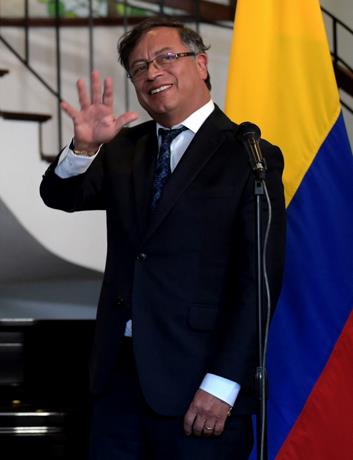The elected president of Colombia, Gustavo Petro, left on Friday in the hands of Cuba the decision to remain as host of the peace talks with the guerrilla National Liberation Army (ELN), which he hopes to resume after his inauguration on August 7.
The suspension of the negotiating table by Colombia, headed by outgoing president Iván Duque in 2019, strained diplomatic relations with Cuba for compliance with the protocols signed between the Colombian State and the guarantor countries, which contemplated that in the event of a breach, the guerrilla command would have a few days to return to their camps.
Duque asked Cuba to extradite them so that they could fulfill their debts with Colombian justice, but Cuba did not give in, safeguarding itself in the protocols. In colombia, Duque continued to fight the guerrillas and demanding the cessation of terrorist acts and the release of those kidnapped as a requirement to return to the negotiating table. The cause of the breakdown of the talks was an ELN attack on a police school in Bogotá in which 22 people died.
“Cuba did not do so well, because they turned it into the excuse for a diplomatic offensive in that country,” Petro told the press after meeting in Bogotá with ambassadors from Latin America and the Caribbean, among whom was the diplomatic representative of Cuba, Javier Caamaño Cairo.
Petro, who is about to become the first left-wing president in Colombia, pointed out that the same protocol allows the negotiations to resume in Havana and extended the invitation to other guarantor countries such as Norway to decide whether to maintain their role. He also indicated that he knows of the willingness of other countries to help in the peace process such as Spain and Chile.
The day before, Chile offered to host the peace negotiations. However, Petro assured that they have not yet made formal progress on the proposal made by Chilean President Gabriel Boric to the elected vice president of Colombia, Francia Márquez, during a visit to her country.
It is about resuming a process that started in 2017 with the then Colombian president Juan Manuel Santos (2010-2018). It was in Quito where the initial rounds of negotiations took place in which bilateral and temporary ceasefires were achieved under the verification of the United Nations. In May 2018, Cuba became the new venue for the dialogue, after Ecuador declined to continue as host.
Petro, who in his youth was a member of the extinct guerrilla M-19, said that his first objective is seek a new bilateral ceasefire with the ELN, which would “automatically bring less violence” to Colombian territories. However, the ELN is not the only armed group in Colombia, the Gulf Clan persists, the most dangerous cartel in the country, and the dissidence of the former Revolutionary Armed Forces of Colombia that did not comply with the peace agreement signed in 2016 with the state.
“The bilateral ceasefire that I would like to see extended to other types of armed organizations that swarm in the country is a good start because it would reduce the deaths,” Petro said, however, he warned that he would not seek negotiation with the Gulf Clan. politics but a submission to justice.
In addition to seeking support to carry out new rapprochements with armed groups, Petro advocated greater regional integration in the meeting with the ambassadors of countries such as Chile, Ecuador, Uruguay, Guatemala, Paraguay, Panama, Mexico, Haiti, Argentina, Peru and Cuba.
assured that can work in a coordinated manner to combat climate changedrug trafficking and transnational crimes, as well as taking a leap towards clean energy with a project promoted by the state oil companies of each country.
Petro intends to open relations towards Africa, strengthen ties with Europe and maintain a good relationship with the United States. He advocated not letting the “growing global conflict with China and Russia become part of our territory. Latin America must always be a territory of peace.”

